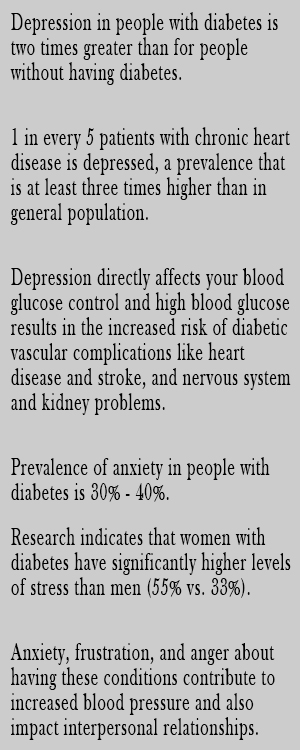 Diabetes particularly Type-2 diabetes, high blood pressure, heart disease, and obesity are categorized as chronic lifestyle diseases which means these diseases are long-standing conditions. Hello friends, in today’s article, I’ll discuss how diabetes and other lifestyle diseases take a toll on your mental health and what is the first psychological issue you might have to carry all the time.
Diabetes particularly Type-2 diabetes, high blood pressure, heart disease, and obesity are categorized as chronic lifestyle diseases which means these diseases are long-standing conditions. Hello friends, in today’s article, I’ll discuss how diabetes and other lifestyle diseases take a toll on your mental health and what is the first psychological issue you might have to carry all the time.
While the traditional management of these health issues includes proper diet, medications, and exercise, the psychological aspects are overwhelming and often neglected by us.
[bctt tweet=”The psychological aspects of chronic health issues are overwhelming and often neglected by us.” username=”@moamal77″]
Psychological disturbances remarkably contribute to the poor perceived health status in all these chronic diseases.
The impact of the diagnosis of these health conditions will have a bearing on the person and his or her family and friends. He has to adapt to the changes it asks for, and he will be compelled to reach the goals he has never thought of before.
The type of disease diagnosis and the expected required changes can at often, become a burden you would have to carry all the time. As you cope with the diagnosis and treatment, you might develop psychological issues, such as depression, stress, anxiety, and anger.
Depression – The main psychological issue in diabetic people
Depression in people with diabetes is ubiquitous – means it is twice more significant than with people without having diabetes.
Statistics show that out of every five patients with any chronic disease, one is depressed – a prevalence that is nearly three times greater than found in the general population. However, given that the healthcare provider does not always detect depression, it frequently remains untreated.
This depression intensifies adverse health outcomes and increases other healthcare costs. This depression directly affects your blood glucose control, and high blood glucose results in the increased risk of diabetic vascular complications like heart disease and stroke, and nervous system, and kidney problems.
Depression in people with type-2 diabetes is also associated with poor diet and medication knowledge, which leads to functional impairment and other higher healthcare costs.
[bctt tweet=”Depression in people with type-2 diabetes is also associated with poor diet and medication knowledge.” username=”@moamal77″]
Other affective disorders, like stress, anxiety, and anger, become visible as well. The prevalence of anxiety in diabetic persons has been reported to be as high as 30-40%.
 According to research, women with diabetes have significantly higher levels of anxiety as compared to men (55% vs. 33%).
According to research, women with diabetes have significantly higher levels of anxiety as compared to men (55% vs. 33%).
Anxiety, frustration, stress, and anger all contribute to increased blood pressure levels and also affect interpersonal relationships.
In such cases, patients face challenges in all their relationships especially when their friends and family members try to manage the treatment of their disease especially when it comes to food or offer unsolicited advice.
Healthcare professionals, family, and friends must stand by and support these individuals during their tough times.
Lifestyle changes like dietary management, regular exercise, and, weight loss have shown significant improvements rather than pharmacological interventions. Providing these patients with the right information and support at the right time through structured education and peer group network will always be of great benefit to these patients.
Discussions about these patients’ psychological well-being can identify whether he or she needs further support. In my vast experience in educating people having these conditions, honest conversations are constructive with such patients that not only address more than their physical health but also build a reliable and trusted relationship.
Such constructive measures when taken early in the natural course of the condition, will result in a more fruitful and positive outcome.
How to improve your mental health
1.. Exercise daily and increase activity level
Here exercise means not joining a gym. I always stay away from the gym. I know its not a good habit. Here at least I don’t compromise my sedentary lifestyle. Instead, I prefer walking. Walk to your destinations instead of driving. Take your dog for a walk. Take the stairs instead of elevators.
2.. Quit smoking
Whenever you smoke, you take in a variety of toxins, and it may be that many of those toxins contribute to your mood problems. Moreover, most of the physical health problems are caused by smoking like heart disease, coughing, bronchitis, emphysema, frequent colds, exercising difficulty, etc. These problems lead to your mood and mental health challenges.
3.. Eat healthily
Your diet directly affects your physical health, and your physical health can undermine your mental health, as simple as that.
4.. Always seek medical advice even for minor issues
Even something as small as a toothache or a bladder infection can temporarily undermine your ability to manage stress, so prompt medical care and advice for any physical issue is always a wise choice.
5.. Practice meditation daily
By meditating, breathing deeply, or just concentrating on your present thoughts for about 20 to 30 minutes every day, you can continuously improve your ability to tolerate frustration, control your temper and manage your anxiety.
6.. Follow your regular sleeping schedule
Most of the sleeping experts agreed and recommended seven to nine hours of sleep every night, but your real key to success is not just the right amount of sleep; it is your regular sleeping schedule. Every night by going to bed at the same time and getting up around the same time every morning, you will make it easier for your body to regulate its sleep-wake cycle and it will also improve your mental and physical health.
Comment below your thoughts whether you agree or disagree with mine in considering diabetes and other lifestyle diseases to affect your mental health.

3 Comments
This is so interesting, I was not aware that diabetes can impact mental health in this way. Depression on its own can be so challenging to manage! Someone close to me has diabetes and your article has really educated me. Thank you very much for sharing important information on your site.
Blessings
Louise
Thank you, and I am glad you agree with my thoughts. Depression, anxiety, stress, and anger all are somewhat linked with one another, and in diabetes and other chronic diseases, it often becomes challenging to manage them thus affecting our mental health badly. It is our responsibility to help and educate our friends, relatives, and family members who are having tough times with these psychological issues.
Thank you for sharing this valuable information! My husband is a Type 2 diabetic and we deal with these issues daily. He loves to stay physically active but with diabetes you have the added issue of poor circulation or decreased circulation to the lower extremities. As a result, he has neuropathy of the feet and cannot feel anything in his feet, so occasionally suffers from a sore developing on the bottom of his foot. The doctor puts him in a boot and that limits his physical activity and causes increased back pain, it’s a vicious cycle…..he can’t do the things he loves to do and depression sets in. I agree with your article completely and I appreciate your research and great presentation of the facts. You presentation was interesting and kept my attention!